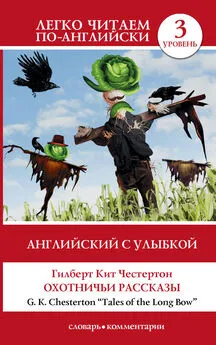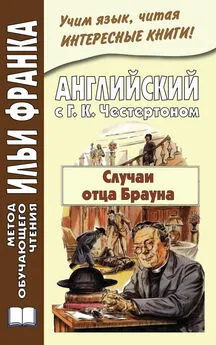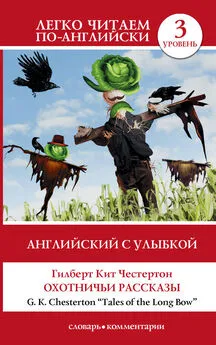Гилберт Честертон - Английский с улыбкой. Охотничьи рассказы / Tales of the Long Bow
- Название:Английский с улыбкой. Охотничьи рассказы / Tales of the Long Bow
- Автор:
- Жанр:
- Издательство:Литагент АСТ
- Год:2017
- Город:Москва
- ISBN:978-5-17-095438-4
- Рейтинг:
- Избранное:Добавить в избранное
-
Отзывы:
-
Ваша оценка:
Гилберт Честертон - Английский с улыбкой. Охотничьи рассказы / Tales of the Long Bow краткое содержание
Для удобства читателя текст сопровождается комментариями и кратким словарем.
Издание предназначается для продолжающих изучать английский язык (уровень 3 – Intermediate).
Английский с улыбкой. Охотничьи рассказы / Tales of the Long Bow - читать онлайн бесплатно ознакомительный отрывок
Интервал:
Закладка:
The Professor blinked at him, but a light burned in the eyes under the heavy eyelids.
“If you come here talking like that – “he began, when Hood cut off his speech by speaking across him to somebody else, with a cheerful rudeness that felt like a kick.
“And what do you say, my dear doctor?” he said to Hunter. “You used to be almost as romantic as myself about the beauty of this place. Do you remember how much you admired the landlords for keeping the place quiet; and how you said the old families preserved the beauty of old England?”
There was a silence, and then the young doctor spoke.
“Well, it doesn’t mean I can’t believe in progress. That’s your problem, Hood; you don’t believe in progress. We must move with the times, and somebody always has to suffer. Besides, the river-water is not so important nowadays. Even the Thames is not so important. When we have the new law, people will have to use the Bulton Filter in any case.”
“I see,” said Hood calmly, “You first make the water dirty for money, and then you try to look good when you force people to clean it themselves.”
“I don’t know what you’re talking about,” said Hunter angrily.
“Well, I was thinking at the moment,” said Hood. “I was thinking about Mr. Bulton. The man who owns the filters. I was wondering whether he might join us. We seem such a happy family party.”
“I cannot see why we should continue this impossible conversation,” said Sir Samuel.
“Don’t call the poor Professor’s theory impossible,” protested Hood. “A little unusual, perhaps. And as for the doctor’s view, surely there’s nothing impossible in that. You don’t think the chemicals will poison all the fish I catch, do you, Doctor?”
“No, of course not,” replied Hunter quickly.
“They will adapt themselves by natural selection,” said Hood dreamily. “They will develop organs suitable to an oily environment – will learn to love petrol.”
“Oh, I have no time for this nonsense,” said Hunter, and he was turning to go, when Hood stepped in front of him and looked at him very steadily.
“You mustn’t call natural selection nonsense,” he said. “I know all about that, at any rate. I can’t tell whether liquids that are spilt on the shore will fall into the river, because I don’t understand hydraulics. I don’t know whether your machinery makes a hellish noise every morning, because I’ve never studied acoustics [18]. I don’t know whether it stinks or not, because I haven’t read your expert’s book on ‘The Nose’. But I know all about adaptation to environment. I know that some of the lower organisms do really change with their changing conditions. I know there are creatures so low that they do survive by surrendering to every kind of mud; and when things are slow they are slow, and when things are fast they are fast, and when things are filthy they are filthy. Thank you for convincing me of that.”
He did not wait for a reply, but walked out of the room after bowing quickly to the rest; and that was the end of the great conference on the question of fisherman’s rights and perhaps the end of the Thames and of the old aristocracy, with all its good and ill.
The general public never heard very much about it; at least until one catastrophic scene which followed. There was some weak echo of the question some months later, when Dr. Horace Hunter decided to go to Parliament. One or two questions were asked about his duties in relation to river pollution; but it was soon clear that no party actually wanted to push the question against the best opinions expressed by their opponents. The greatest living authority on hygiene, Professor Hake, had actually written to The Times (in the interests of science) to say that in such a hypothetical case as this, a medical man could only do what Dr. Hunter had done. It so happened that the most important business in that part of the Thames Valley, Sir Samuel Bliss, had himself, after some serious consideration of different policies, decided to Vote for Hunter. The great organizer’s own mind was rather abstract and philosophical in the matter; but it seems that his manager, a Mr. Low, had a more practical and pushing spirit. He warmly invited his employees to vote for Hunter, pointed out to them the many practical advantages they would gain if they voted for the doctor, and the even more practical disadvantages they might suffer if they didn’t. So it followed that the blue ribbons, which were the local badges of the Hunterians, were not only attached to the iron railings and wooden posts of the factory, but to various human figures, known as “hands,” which moved in it.
Hood took no interest in the election; but while it was proceeding he followed the matter a little further in another form. He was a lawyer, a lazy, but in some ways a good one; because he enjoyed studying and so he had originally learned the trade he had never used. More in protest than in hope, he once carried the matter into the Courts, defending his cause on the basis of a law of Henry the Third [19]against frightening the fish of the King’s servants in the Thames Valley. The judge complimented him on his erudition and logic, but rejected his appeal while demonstrating his own erudition and logic. His lordship argued that no test was provided to measure the degree of fear in the fish, or whether it was that serious fear which was important for the law. But the great judge pointed out the precedent of a law of Richard the Second [20]against certain witches who had frightened children; in which case the child “must return and of his own will testify to his fear.” It did not seem that any one of the fish in question had returned and gave any such testimony to any proper authority. So the judge chose in favour of the defendants. And when the learned judge happened to meet Sir Samuel Bliss at dinner that evening, he was congratulated on his clear judgement. Indeed, the great judge had really enjoyed the logic both of his own and Hood’s arguments; but the conclusion was inevitable. For our judges are not stopped by any old code; they are progressive, like Dr. Hunter, and make friends only with the progressive forces of the age, especially those they will probably meet at a dinner party.
But it was this short law case that led to something much more important for Mr. Owen Hood. He had just left the courts, and turned down the street that led in the direction of the station, he was walking in that direction in his usual brown coat. The streets were filled with faces; it struck him for the first time that there were thousands and thousands of people in the world. There were even more faces at the railway station, and then, when he looked at four or five of them, he saw one that was to him as incredible as the face of the dead.
She was coming out of the tea-room, carrying a handbag, just like anybody else. That mystical quality of his mind had fixed his sacred dream in its original colours. No detail could be changed without the vision dissolving. It was impossible for him that she could appear in anything but white or come out of anything but a wood. And he found himself turned upside-down by the fact that blue suited her as well as white. She did not come out of the wood, but even the teashops and the railway stations didn’t spoil the view.
She stopped in front of him and her pale, flying eyelids lifted from her blue-grey eyes.
“Why,” she said, “you are the boy that jumped in the river!”
“I’m no longer a boy,” answered Hood, “but I’m ready to jump in the river again.”
“Well, don’t jump on the railway-line,” she said, when he turned quickly in that direction.
“To tell you the truth,” he said, “I was thinking of jumping into a railway-train. Do you mind if I jump into your train?”
“Well, I’m going to Birkstead,” she said with some doubt in her voice.
Mr. Owen Hood did not care one bit where she was going, because he had decided to go there, but he actually remembered a little station on that line that lay very near to where he was going, so he tumbled into the carriage. The landscapes shot by them while they sat looking in a dazed and almost foolish manner at each other. At last the girl felt how absurd it all was and smiled.
“I heard about you from a friend of yours,” she said; “he came to call on us soon after it happened. At least that was when he first came. You know Dr. Hunter, don’t you?”
“Yes,” replied Owen, a shadow coming over his shining hour. “Do you… Do you know him well?”
“I know him pretty well now,” said Miss Elizabeth Seymour.
The shadow on his spirit became darker; he suspected something quite suddenly, and the idea made him furious. Hunter, in Crane’s old phrase, was not a man who would let the grass grow under his feet. It was so like him to use the incident as an introduction to the Seymours. Things were always stepping-stones for Hunter, and the little rock in the river had been a stepping-stone to the country-house. But was the country-house a stepping-stone to something else? Suddenly Hood realized that all his anger had been very abstract anger. He had never hated a man before. At that moment the train stopped at the station of Cowford.
“I wish you’d get out here with me,” he said quickly, “only for a little – and it might be the last time. I want you to do something.”
She looked at him with a curious expression and said in a rather low voice, “What do you want me to do?”
“I want you to come and pick bluebells,” he said.
She stepped out of the train, and they went up a country road without a word.
“I remember!” she said suddenly. “When you get to the top of this hill you see the wood where the bluebells were, and your little island beyond.”
“Come on and see it,” said Owen.
They stepped on the top of the hill and stood. Below them the black factory threw its yellowish smoke into the air; and where the wood had been there were now rows of little houses like boxes, built of dirty yellow brick.
Hood spoke. “And when you see the abomination of desolation sitting in the Holy of Holies [21]– isn’t that when the world is supposed to end? I want the world to end now – with you and me standing on a hill.”
She was staring at the place with parted lips and she was paler than usual; he knew she understood something monstrous and symbolic in the scene; yet her first remark was short and trivial. On the nearest of the yellow brick boxes she could see the cheap colours of different advertisements; and larger than the rest a blue poster proclaiming “Vote for Hunter.” With a final touch of hatred, Hood remembered that it was the last and most important day of the election. But the girl had already found her voice.
“Is that Dr. Hunter?” she asked with very usual curiosity; “is he standing for parliament?”
A load that lay on Hood’s mind like a rock suddenly rose like an eagle; and he felt as if the hill he stood on were higher than Everest. He understood well enough that SHE would have known well enough whether Hunter was standing, if —
if there had been anything like what he supposed. Suddenly, the weight wasn’t there anymore, and he lost his balance and said something quite indefensible.
“I thought you would know. I thought you and he were probably… well, the truth is I thought you were engaged, though I really don’t know why.”
“I can’t imagine why,” said Elizabeth Seymour. “I heard he was engaged to Sir Samuel’s daughter. They’ve got our old place now, you know.”
There was a silence and then Hood spoke suddenly in a loud and cheerful voice.
Читать дальшеИнтервал:
Закладка:




